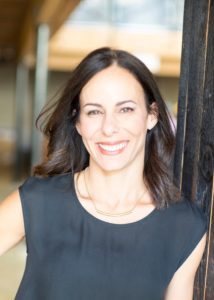San Francisco-based Freestyle is a seed-stage fund currently run by serial entrepreneurs Jenny Lefcourt, who joined the fund as a partner in 2014, and David Samuel, who co-founded Freestyle in 2009 with Josh Felser.
Subscribe to the Crunchbase Daily

We spoke with Lefcourt, who left Stanford Business School halfway to her degree to start her first company, Wedding Channel, in the late ’90s. After its acquisition by The Knot, which is part of XO Group, she co-founded Bella Pictures, which was also acquired. Lefcourt is also a founding member of All Raise, a group that advocates for increasing the number of female startup investors and entrepreneurs.
The Freestyle team is a year into investing from its $102 million fund 5. It will invest in around 25 companies with approximately $2 million for the first check, she said, and then some reserve held for follow-on funding.
Portfolio companies mentioned in our conversation include professional coaching platform BetterUp, and video call clipping service Grain in the the future of work category, turnkey apartment company UpsideHoM in eldertech, and low-code no-code companies Daily.co, that provides video chat APIs, and relational database company Airtable.
Here is our conversation. The following was lightly edited for length and clarity.
How do firms operate to succeed at seed? What do you think is important for a firm to make its mark?
Lefcourt: You have to do a few things really well.
First off, I think you have to have a broad network that thinks very highly of you and brings great opportunities to you. Because we can go out looking, but it’s not nearly as great as when you have this wide network bringing us opportunities.
You have to prove that you’re really, really good at helping founders be successful. That you don’t deplete them, only help them and energize them and make them better.
Founders do their homework. There’s an abundance of capital, so they’re going to pick capital from the VCs known to be the best at what they do. When founders talk to other founders, what they’re looking for is who actually helps—doesn’t just claim they’re going to help, but actually shows up, dedicates the time and the brain power, and helps.
But also gets out of the way, and knows that it’s not their company. That is very much the way we operate. It’s why Freestyle got started in the first place.
There’s more and more competition for every opportunity now. I think the main way we’ve been able to “win deals” is by the reputation we’ve gotten from over 150 founders we’ve backed.
What do you do to help companies succeed?
Lefcourt: We really understand who they are, what challenges they are facing and what we need to do to help them the most. That looks different for each company.
I would say there’s a variety of things. A lot of times it’s a first time founder, and just providing the framework and the understanding of, “Hey it’s great that you’re doing this, but keep your eyes up, because here’s your next three steps.”
I often say my job is to turn the lights on. They’re going down this path they’ve never gone down. If I can make that path much brighter and clearer, make them stronger as they go down it, and provide them with the right resources along the way, then I’m doing my best job.
A lot of it is really putting a light on the endpoint, so they understand what they’re trying to achieve in this milestone. And providing such clarity, that they can see it and then achieve it.
A lot of times during the messy phase, the seed stage, you’re not exactly sure what to do, what not to do, and where you’re going.
Are most of the founders you invest in first-time founders or serial founders?
Lefcourt: I would guess that we’re probably about 60 percent first-time founders and 40 percent repeat founders.
Does one have an advantage over the other?
Lefcourt: Serial founders know that hallway a little bit better; that path is less murky. But other than that I don’t think so. There is some data to suggest that serial founders are more likely to be successful getting the Series A, but in the long term they’re not more successful. I don’t know if that data still holds.
We are very open to the right opportunity, the right founder, period. And if they are serial, sometimes it’s a bonus, but it’s not necessary at all.
Is there a wave of technology that you’re riding, or sectors that are really interesting for Freestyle right now?
Lefcourt: What I’m looking at investing in, is less on new bleeding-edge technology and more on new consumer behavior, or new behavior in a market.
I think a few of the markets are in a major transition, and the world in five years looks vastly different than how it looks today, and therefore I am excited about them.
One is the future of work. The future is so unknown. We’re literally at the tip of the iceberg of seeing how much work is changing, how decisions are made, and how teams are performing.
The next area that I see so much change and truly a seismic shift in the numbers is eldertech. The old paradigm of you live at home and then you go to some kind of older community, those days are over. There was already a trend away from them pre-COVID. It is reinventing how people live, and how people have the right services and the right tech tools to thrive.
The last one is low-code no-code. It’s really hard to find enough technical people and to get the features out fast enough. You now have all these tools being built, which enable incredible technology with one line of code.
I did invest in Daily.co. It’s an API so that anyone who’s building a platform can have audio and video within the platform.
Anyone who is starting a company tomorrow in health tech doesn’t have to find all these developers to build that functionality. There’s literally one line of code and they are in business. We’re going to see a lot more of these sort of tools that enable people who are not technical, to create so much more, better and faster.
What do you feel the impact of All Raise has been?
Lefcourt: I think the major impact of All Raise has been awareness and enabling people to make better choices and understand how to stay competitive in the future.
If you look at the numbers today, they’re not that encouraging, but we’re starting to see signs of leading indicators that good work is being done and good things are happening. You have more women at the firms who are making these decisions. You have now more women, a greater percentage, who are getting seed funding.
You can look at the capital gap and this is abysmal. But those monster rounds can only happen if they receive seed five years ago.
Illustration: Dom Guzman

Stay up to date with recent funding rounds, acquisitions, and more with the Crunchbase Daily.








![Illustration of pandemic pet pampering. [Dom Guzman]](https://news.crunchbase.com/wp-content/uploads/2021/03/Pets-2-300x168.jpg)
67.1K Followers